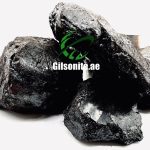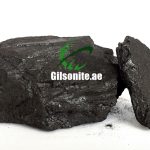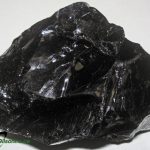Gilsonite in Chemical Manufacturing: Uses, Applications, and Benefits
Gilsonite, also known as natural bitumen, is a naturally occurring solid hydrocarbon resin. Its unique properties make it a valuable material in various industries, including chemical manufacturing. This blog explores the diverse applications of Gilsonite in chemical manufacturing, highlighting its benefits and showcasing how Gilsonite.ae supplies high-quality Gilsonite to meet industry needs.
What is Gilsonite?
Gilsonite is a naturally occurring, solid hydrocarbon classified under bitumen. It forms through the solidification of crude oil over millions of years and has a glossy black appearance. Chemically, it is composed of asphaltenes and resins, with excellent solubility in organic solvents. Gilsonite is unique for its:
-
High fixed carbon content
-
️ Resistance to heat and chemicals
-
Strong binding properties
-
Low ash and moisture content
This material is highly valued for its high carbon content, excellent adhesion properties, and chemical resistance.
Properties of Gilsonite in Chemical Manufacturing
Understanding the properties of Gilsonite is essential to appreciate its applications in chemical manufacturing:
- High Carbon Content: Gilsonite contains a high percentage of carbon, making it an excellent binder and adhesive.
- Thermal Stability: It has a high melting point and can withstand significant temperature variations, making it suitable for high-temperature processes.
- Chemical Resistance: Gilsonite is resistant to many chemicals, including acids, alkalis, and solvents, which makes it ideal for use in harsh chemical environments.
- Adhesion: Its natural adhesive properties make it a valuable ingredient in various chemical formulations.
- Solubility: Gilsonite is soluble in aromatic and aliphatic solvents, which broadens its range of applications in chemical processes.
Gilsonite vs. Synthetic Chemical Additives
| Property | Gilsonite | Synthetic Resins |
|---|---|---|
| Origin | Natural (mineral) | Petroleum-based |
| Environmental Impact | Low | High |
| Cost per Kg | Lower | Higher |
| Thermal Stability | Excellent | Variable |
| Resin Compatibility | High (with phenolic, epoxy) | Depends on type |
| Availability in Mesh Sizes | 200, 300, 400+ mesh | Limited |
Industrial Uses of Gilsonite in Chemical Manufacturing:
1. Adhesives and Sealants
Gilsonite is used in phenolic, epoxy, and hydrocarbon resins as a natural resin extender and performance improver. It enhances:
-
Mechanical strength
-
️ Thermal resistance
-
Adhesion to substrates
It reduces manufacturing costs by replacing synthetic resins partially while maintaining performance in industrial glues, automotive sealants, and thermoset adhesives.
Gilsonite’s natural adhesive properties make it an excellent component in the production of adhesives and sealants. Its high carbon content and chemical resistance enhance the performance of these products, providing superior bonding and durability. Benefits:
- Strong Bonding: Gilsonite enhances the bonding strength of adhesives, making them suitable for demanding applications.
- Durability: Sealants containing Gilsonite are more durable and resistant to environmental factors such as moisture, temperature changes, and chemicals.
- Versatility: Gilsonite can be used in various types of adhesives and sealants, including hot-melt adhesives, pressure-sensitive adhesives, and construction sealants.
2. Ink and Coating Compounds
In printing inks and chemical coatings, Gilsonite acts as a hard resin and black pigment additive, offering:
-
Improved gloss and pigment dispersion
-
️ Faster drying time
-
️ Resistance to abrasion and chemicals
It is especially useful in gravure, flexographic, and offset inks for packaging and publication.
In the ink and coatings industry, Gilsonite is used as a resin to improve gloss, adhesion, and durability. Its high carbon content and solubility in organic solvents make it an excellent additive for enhancing the performance of printing inks and industrial coatings. Benefits:
- Enhanced Gloss: Gilsonite improves the gloss and appearance of inks and coatings, making them more visually appealing.
- Improved Adhesion: Inks and coatings with Gilsonite exhibit better adhesion to various substrates, including metals, plastics, and paper.
- Durability: The chemical resistance and thermal stability of Gilsonite enhance the durability of inks and coatings, ensuring long-lasting performance.
️ 3. Asphalt Modification
Gilsonite is widely used in the modification of asphalt to improve its performance in road construction. It enhances the durability, flexibility, and resistance to deformation of asphalt, making it ideal for high-traffic areas and extreme weather conditions. Benefits:
- Increased Durability: Gilsonite-modified asphalt is more resistant to cracking, rutting, and other forms of deformation.
- Flexibility: The addition of Gilsonite improves the flexibility of asphalt, allowing it to better withstand temperature fluctuations.
- Cost-Effectiveness: Using Gilsonite in asphalt modification can reduce maintenance costs and extend the lifespan of road surfaces.
4. Rubber and Plastic Compounding
Chemical manufacturers use Gilsonite in rubber and plastic formulations as a reinforcing filler and flow enhancer. It provides:
-
Enhanced hardness and tensile strength
-
Thermal conductivity improvement
-
⚙️ Viscosity control in thermoplastics
Gilsonite also functions as a cost-effective replacement for carbon black or synthetic resins in black masterbatch formulations.
In the rubber and plastics industry, Gilsonite is used as a reinforcing agent and filler. Its high carbon content and chemical resistance improve the mechanical properties of rubber and plastic products, making them more durable and resistant to wear and tear. Benefits:
- Enhanced Strength: Gilsonite improves the tensile strength and elasticity of rubber and plastic products.
- Chemical Resistance: Products containing Gilsonite are more resistant to chemicals, oils, and solvents.
- Cost Savings: Gilsonite is a cost-effective additive that can reduce the overall production costs of rubber and plastic products.
️ 5. Drilling Fluids
Gilsonite is an essential component in drilling fluids used in the oil and gas industry. Its unique properties help stabilize wellbores, control fluid loss, and improve lubricity, making drilling operations more efficient and cost-effective. Benefits:
- Wellbore Stability: Gilsonite helps stabilize wellbores by reducing the likelihood of collapse and improving hole cleaning.
- Fluid Loss Control: Its inclusion in drilling fluids helps control fluid loss, preventing damage to the formation and reducing costs.
- Lubricity: Gilsonite improves the lubricity of drilling fluids, reducing friction and wear on drilling equipment.
6. Chemical Binders in Foundry Sand
Gilsonite acts as a natural binder and lustrous carbon source in foundry sand chemical mixtures, improving:
-
️ Mold strength and thermal resistance
-
️ Finish of cast metal surfaces
-
Compatibility with synthetic binders
It is especially effective in ferrous casting operations where improved casting precision and surface quality are desired.
In the foundry industry, Gilsonite is used as an additive in foundry sands to improve the quality of castings. Its high carbon content enhances the sand’s ability to retain its shape and resist deformation during the casting process. Benefits:
- Improved Sand Strength: Gilsonite increases the strength and stability of foundry sand, reducing defects in castings.
- Enhanced Surface Finish: Castings produced with Gilsonite-modified sand have a smoother surface finish, reducing the need for post-processing.
- Reduced Defects: The use of Gilsonite in foundry sands minimizes casting defects such as cracks and inclusions.
✅ Advantages of Using Gilsonite in Chemical Applications
-
Natural Performance Additive – Reduces reliance on synthetic resins and additives
-
⚖️ Cost-Effective – High functionality at a lower cost per unit
-
️ Thermal & Chemical Stability – Performs well in chemically aggressive and high-temperature environments
-
Eco-Friendly – Naturally derived with minimal processing and emissions
-
Excellent Binding Strength – Reinforces polymers, adhesives, and compounds
-
⚙️ Customizable Grades – Available in various mesh sizes and purity levels
Future Trends: The Role of Gilsonite in Advanced Chemical Manufacturing
As the chemical manufacturing industry continues to evolve, the use of advanced materials and techniques will become increasingly important. Gilsonite is expected to play a significant role in the following trends:
1. Sustainable Manufacturing
With a growing emphasis on sustainability, Gilsonite’s natural origin and low environmental impact make it an ideal choice for sustainable chemical manufacturing practices.
- Eco-Friendly Additive: Gilsonite’s natural composition and minimal processing requirements make it an environmentally friendly option.
- Reduced Emissions: The use of Gilsonite can contribute to reduced emissions and energy consumption in chemical processes.
2. Advanced Materials
The development of advanced materials with superior properties will drive the demand for high-performance additives like Gilsonite.
- Enhanced Material Properties: Gilsonite can be used to improve the mechanical, thermal, and chemical properties of advanced materials.
- Broader Applications: As new materials are developed, the range of applications for Gilsonite in chemical manufacturing will expand.
3. Innovation in Chemical Processes
Innovative chemical processes that require high-performance additives will benefit from the unique properties of Gilsonite.
- Process Optimization: Gilsonite can be used to optimize chemical processes, improving efficiency and reducing costs.
- New Applications: Ongoing research and development will uncover new applications for Gilsonite in chemical manufacturing.
Gilsonite.ae: As your Gilsonite Supplier for Chemical Manufacturing?
Gilsonite.ae is a leading supplier of high-quality Gilsonite, providing tailored solutions to meet the specific needs of the chemical manufacturing industry. Here’s how Gilsonite.ae supports its customers:
Quality Assurance
Gilsonite.ae ensures that their Gilsonite meets stringent quality standards, providing consistent and reliable performance for chemical manufacturing applications.
- High Purity: Their Gilsonite is of high purity, ensuring minimal impurities and consistent performance.
- Consistency: Strict quality control measures ensure that each batch of Gilsonite meets the required specifications.
Customized Solutions
Understanding that different chemical manufacturing processes have unique requirements, Gilsonite.ae offers customized solutions to meet specific needs.
- Tailored Products: They provide Gilsonite in various grades and specifications to match the requirements of different applications.
- Technical Support: Gilsonite.ae offers technical support to help customers optimize the use of Gilsonite in their processes.
Reliable Supply Chain
Gilsonite.ae has a robust supply chain network, ensuring timely delivery of Gilsonite to chemical manufacturers around the world.
- Timely Delivery: They prioritize timely delivery to minimize production disruptions and ensure a steady supply of Gilsonite.
- Global Reach: With a global distribution network, Gilsonite.ae can supply customers in various regions, supporting their production needs.
❓ FAQs about Gilsonite in Chemical Manufacturing
❓ What is Gilsonite used for in chemical industries?
Gilsonite is used as a binder, resin extender, pigment additive, and viscosity modifier in adhesives, inks, coatings, and drilling additives.❓ Is Gilsonite a natural chemical additive?
Yes, Gilsonite is a naturally occurring hydrocarbon resin, offering a sustainable alternative to petroleum-based chemical additives.❓ Can Gilsonite replace synthetic resin in adhesive formulas?
Gilsonite can partially replace phenolic or hydrocarbon resins in adhesives, reducing costs while maintaining performance in bonding strength and thermal resistance.❓ Is Gilsonite chemically stable?
Yes, Gilsonite shows excellent stability under thermal and chemical stress, making it suitable for industrial-grade formulations.❓ What forms is Gilsonite available in?
Gilsonite is sold as lump, granular, and powder (up to 400 mesh), customized to suit specific chemical applications.Conclusion- Uses of Gilsonite in Chemical Manufacturing
Gilsonite stands out as a high-performance natural additive in chemical manufacturing. Its unique combination of solubility, thermal stability, and binding strength makes it an ideal component in adhesives, coatings, inks, and drilling fluids. ️ Compared to synthetic alternatives, Gilsonite offers superior environmental performance and cost-efficiency, making it a preferred choice for industrial chemists and manufacturers.
Its compatibility with various resins and polymers allows for broad integration in formulations requiring durability, chemical resistance, and consistency. Whether used to reinforce polymers, stabilize drilling additives, or extend resins, Gilsonite continues to prove its value in the evolving field of chemical manufacturing.
Learn how Gilsonite is used in chemical manufacturing for resins, inks, drilling fluids, and more. Discover its advantages, properties, and benefits. You can Read More about Powder Gilsonite and Gilsonite in PUBLtd & Gilsonite.AE
- Applications of Gilsonite in chemical production
- Gilsonite in industrial chemical processes
- Gilsonite’s role in chemical formulations
- Gilsonite in resin, paint, and coating production
- Gilsonite’s contribution to chemical processes
Call to Gilsonite AE.
Need high-purity Gilsonite for chemical applications?
We in Gilsonite.ae, supply industrial-grade Gilsonite in powder and granular form, optimized for resin, ink, rubber, and drilling formulations.
If You have any other Query or Question you want to ask, Please don’t hesitate to Contact Us.







